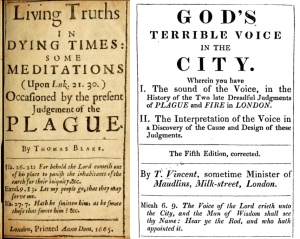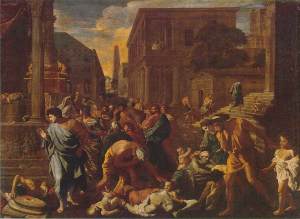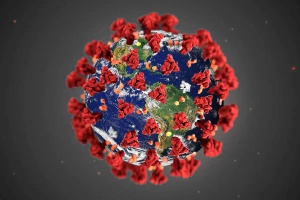I mostly steer clear of politics on this blog – other than pleading with US readers not to vote for Trump. But sometimes it feels like you maybe have to say something. Or better still, do something… even if that’s only signing a petition, or waving a makeshift placard and walking slowly through London.
Last Saturday – 11th November, Armistice Day in the UK – I (with hundreds of thousands of others) joined the National March for Palestine in London. There’s been a lot of misrepresentation and misinformation about the march by mainstream media and on social media, so I wanted to write about what I actually witnessed.
First though, some crucial things I need to say up front:
- Antisemitism is always utterly wrong and abhorrent, full stop.
- Being pro-Palestinian does not mean being anti-Israeli. One can (and I believe must) be both pro-Palestinian and pro-Israeli – what else can lead to any lasting solution?
- In my view, what Hamas did on 7 October was an unspeakable and unjustifiable atrocity. Being pro-Palestinian, and calling for an immediate ceasefire, does not have to mean supporting Hamas or condoning their actions.
- Conversely, criticism of the actions and rhetoric of Israel’s secular government is not inherently antisemitic. The response of the Israeli government and military since 7 Oct has been utterly disproportionate and appalling; the huge numbers of Palestinian civilian deaths – including the deaths of over 4500 children – cannot be justified. Two wrongs cannot make a right; responding to the killing of civilians with the killing of even more civilians can never be the answer.
- Overall, the long-term situation in Israel-Palestine is incredibly complex and can’t be reduced to a simplistic case of one side good, the other side bad. Any of us who thinks they fully understand all the historical and current complexities, rights and wrongs of the situation is probably mistaken. But ultimately there needs to be justice, peace, freedom and equality for both Palestinian and Israeli people – and for decades this has very much not been the case.
- Finally, there is nothing un-British or disrespectful about joining a march for peace on Armistice Day – quite the contrary. Armistice literally means ‘ceasefire’ (‘arms stoppage’, etymologically). Furthermore, an estimated 12,000 Palestinians volunteered to serve in the British army in the Second World War and they deserve to be remembered – as do the 30,000 Jewish volunteers from what was then Palestine.
The march
The National March for Palestine on 11 November, organised by the Palestinian Solidarity Campaign, was just the latest in a weekly series of Saturday demonstrations calling for an immediate ceasefire in Gaza. I’m not sure it was originally planned particularly to coincide with Armistice Day – it just happened to fall on the same day of the week. The event’s main slogan (and one of its most-repeated chants) was simply ‘Ceasefire now’ – entirely appropriately for Armistice Day, as several placards pointed out.
The march started in Hyde Park, passed Victorian Station (where I, running slightly late, joined it), crossed the Thames via Vauxhall Bridge and finished outside the US Embassy in Vauxhall, entirely avoiding the Cenotaph. No-one seems sure how many people took part, but it was a lot – the Met police estimated at least 300,000; some have suggested 800,000 or even more.
Jewish solidarity
There was a large police presence, but no sign of any confrontations between marchers and police, nor of a desire for any. The protest as I witnessed it was peaceful and respectful; pro-Palestinian, for sure, and angry/upset about the actions of Israel’s government, but in no way antisemitic. Indeed, it was deeply moving and humbling to see many Jewish people and Jewish organisations taking part alongside Palestinian groups. Here are some of the many powerful slogans I personally saw on Jewish participants’ placards:
- Jews say Cease Fire
- Not In Our Name. Free Palestine
- Our grief is not your weapon
- My mother survived the Holocaust. But died ashamed of Israel’s actions in her name
- This Jew wants Palestinians to be free from the river to the sea
- Jewish and for a Free Palestine! This Jew says: Ceasefire!! Don’t use the 7/10 massacres to justify genocide
- UK Jews Demand: Stop the Genocide, End the Siege
- Jews Against Genocide
- Jews for Justice for Palestinians
- Jewish Voice for Labour: Always with the Oppressed, Never with the Oppressor.
Others held aloft actual olive branches, or pictures of peace doves.
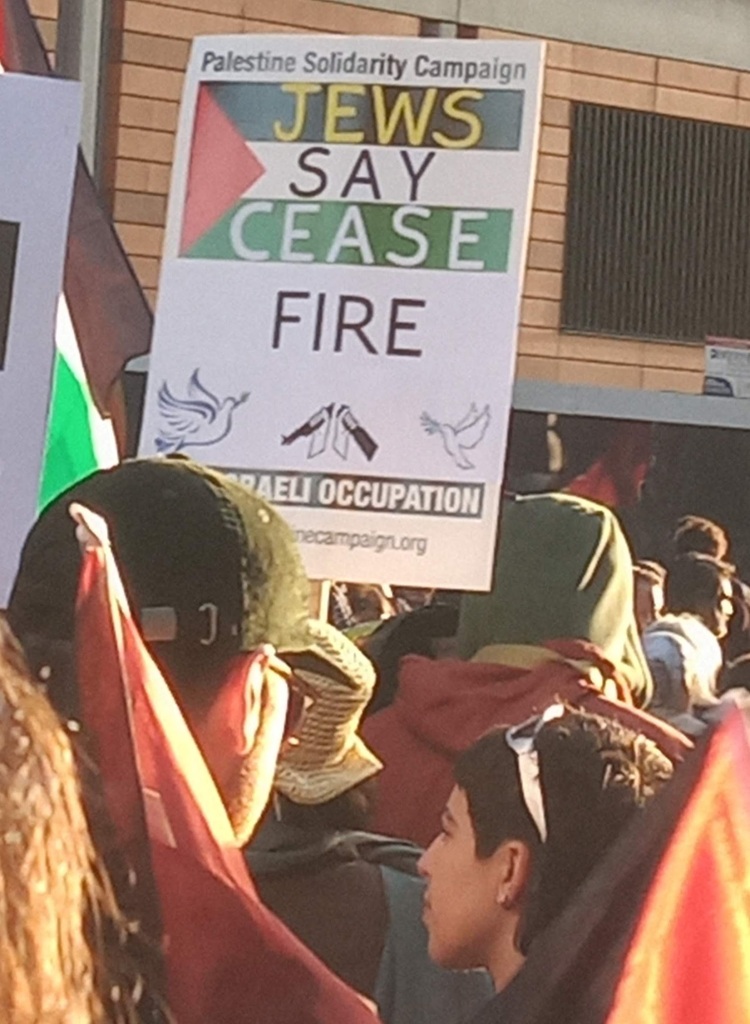
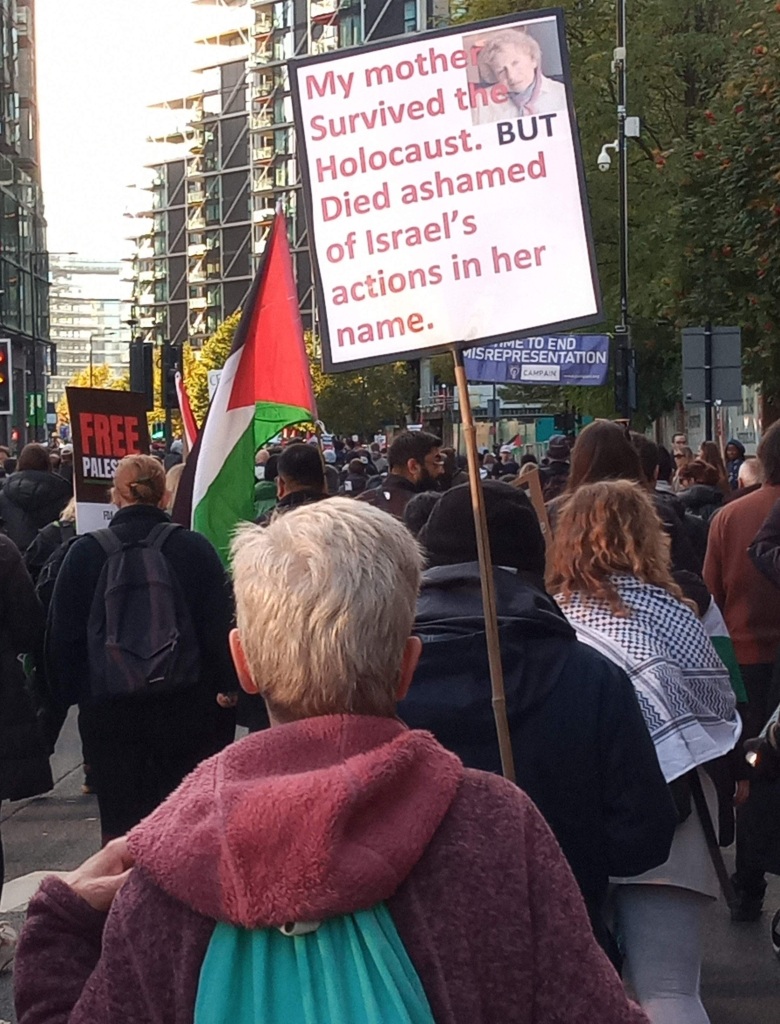
My own placard read, somewhat simplistically, ‘Peace for Palestinian + Israeli people’, featuring the flags of both groups; and on the reverse, ‘Cease firing on children’. I had a moving encounter with a smiling Jewish woman who wanted to photograph my placard, and shook hands with several others who seemed to appreciate the message of peace for both sides in the conflict. Of course I realise that though the placard’s sentiment is nice, finding any real peaceful solution will be incredibly complex and difficult. I don’t believe it’s impossible; so many Palestinian and Israeli people desperately want it and have joined together to work for it. But sadly neither Israel’s government nor Hamas seem to have any desire for true peace and justice.
Remembering the dead
My wife’s more thought-through placard read ‘I’m a primary school teacher. 4,506 Palestinian children killed since 7 Oct = 150 classes of 30 children. 14 classes in my school so that’s >10 whole schools’.
At the end of the march, three people read aloud the names of just 50 of the Palestinian children who had been killed, along with a powerful poem by Michael Rosen, ‘Don’t Name the Dead Children’. (Here he is reading it at a similar protest 9 years ago: https://www.youtube.com/watch?v=oTwmx5_CFKE). Michael Rosen is of course Jewish, making the words that much braver and more powerful.
*
Did I agree with all the words or actions of fellow protestors? On the whole, yes. Out of hundreds of placards I saw, there were a handful with messages I wouldn’t have chosen – primarily the ubiquitous Socialist Worker ones which are just too far-left for me. Out of all the chants, there were a few I decided not to join in with, not because I believe they were antisemitic but just because they didn’t really represent my position. And I didn’t massively appreciate fireworks being set off right above us towards the end – but the march organisers repeatedly called for people not to do this.
Overall though, it was one of the most peaceful, respectful and even beautiful demonstrations I’ve ever been part of, and I was so glad to lend my voice to those calling for a ceasefire. The only aggression and disrespect I witnessed (and I didn’t see much myself, though I hear there was more) was from groups of far-right counter-protestors.
Is this all just self-righteous liberal virtue-signalling? I hope not. I’m really not looking for any praise for taking part in the march, and I’m not too bothered by any censure either. Other viewpoints than mine are valid and important. And I reiterate that I am utterly and equally opposed both to antisemitism and to anti-Palestinian sentiment – as well as to genocide, acts of terror, disproportionate violence and state oppression.
My presence at the march was essentially unimportant, but the situation in Gaza is anything but. It is very real and unthinkably awful, and the international community must do all in their power to bring about an immediate ceasefire and to get far more humanitarian aid into Gaza. Enough is enough.
And whichever side we may identify with more in this (and any other) conflict, if we’re Christians, Christ calls us to love our enemies, pray for those who harm us (or harm those we identify with), repay good for evil. Blessed are the peacemakers. I’m not a dyed-in-the-wool pacifist or dewy-eyed hippy but I don’t believe violence can ever be the solution for those who seek to follow the Prince of Peace.
Some other people’s voices (and a petition)…
Oxfam petition: Ceasefire now
Jewish Voice for Peace
Beer Christianity newsletter reflecting on Suella’s sacking and Saturday’s march
Beer Christianity newsletter: Why they think we hate Israelis
Archbishop of Canterbury makes ‘moral cry’ for Israel-Hamas ceasefire (The Guardian)
And a couple of voices expressing a rather different perspective, from the Israeli side – uncomfortable reads for me but important to hear another side to the story:
To my Western leftist friends, from your leftist Israeli friend | by Yuval Idan
Why Palestinian supporters are hypocrites | by Alexander Olivier von Stauffenberg

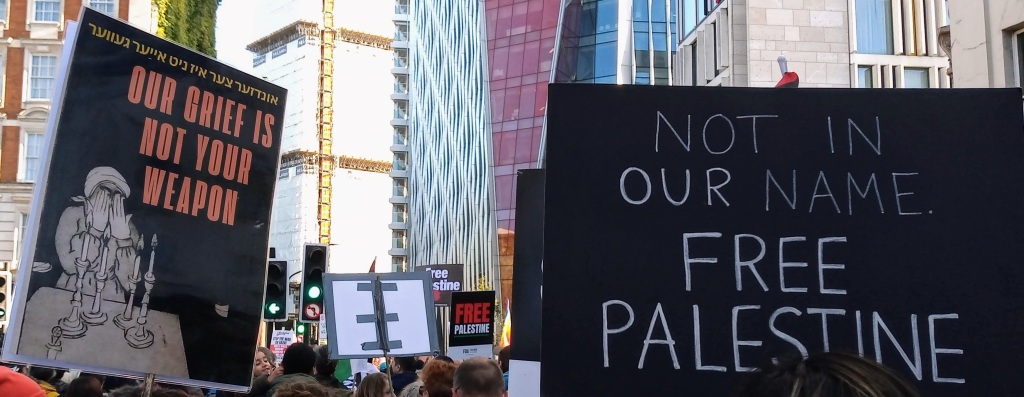
 I don’t of course mean that Jesus was a 1st-century Che Guevara, though I do still like this image (right).
I don’t of course mean that Jesus was a 1st-century Che Guevara, though I do still like this image (right). 